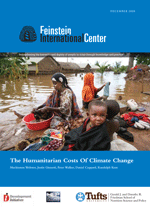Using existing international databases that track disaster occurrence and humanitarian costs, this research attempts to improve understanding of how climate change may affect international humanitarian spending. Employing four distinct methodological approaches, a range of potential impact scenarios is developed. The findings indicate that climate change will have a significant impact on humanitarian costs and the increase could range from a 32% increase, taking into account only changes in frequency of disasters, to upwards of a 1600% increase when other criteria, such as intensity, are also taken into account.
Further, the report highlights that extreme weather events do not occur in isolation and the increasing interconnectedness of world economic and political systems has made disasters more complex and destructive. The report makes a number of recommendations, including the need for more rigorous and systematic collection of disaster-related data and more constructive interaction between the humanitarian and climate change communities on future research, planning, and action.







